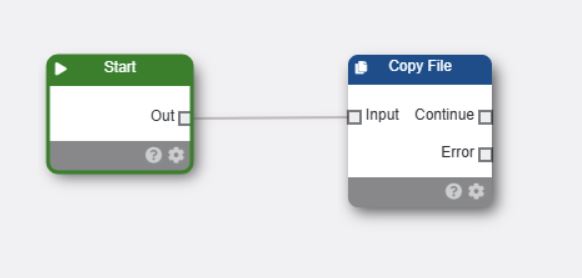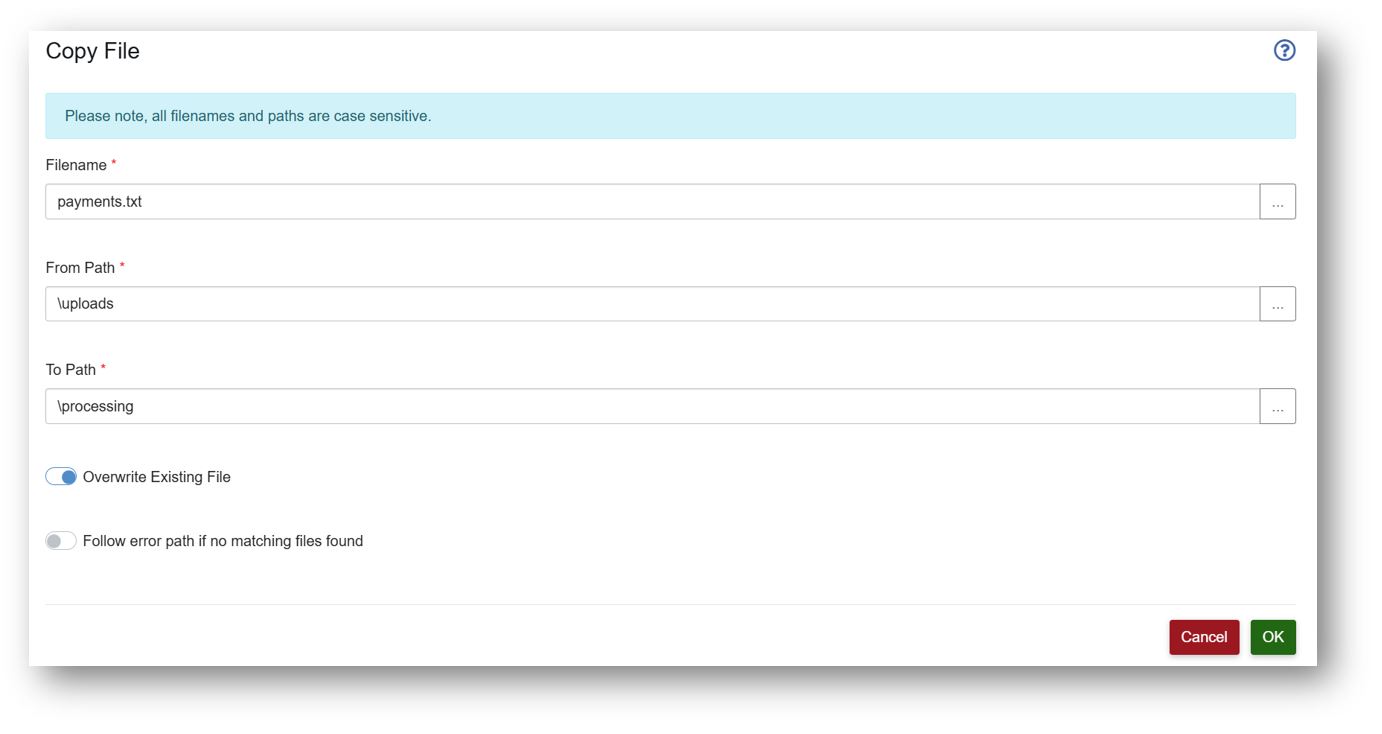Copy File
Purpose
Copies one or more files from one folder to another.

Usage
The File Copy node attempts to copy a file from one location, in your customer area on Paygate, to a destination location, also in your customer area.
Once successfully copied the workflow continues down the ‘continue’ path to the next node.
If there are any errors during the copy process then the workflow will flow down the error path.

Filename
The name of the file(s) that will be copied. This can be either:
- A fixed (static) filename such as mypayments.csv
- A Wildcard filename such as mypayments.*
- A variable such as {filename}
Please note: As indicated in the node configuration popup, filenames and paths are case sensitive. MyPayments.txt is treated as a different file to mypayments.txt.
Wildcards
Standard * and ? wildcards are fully supported allowing you to copy all files matching a particular wildcard pattern.
The node can also use more advanced wildcards such as those based around ranges: […]
| Wildcard | Description | Example | Matches | Does not match |
|---|---|---|---|---|
| * | matches any number of characters | myfile.txt | myfile.txt or myfile.csv | myfile1.txt |
| ? | matches a single character | myfile?.txt | myfile1.txt | myfile22.txt |
| [abc] | matches one of the characters provided | [pf]ile.txt | file.txt, pile.txt | mile.txt |
| [a-z] | matches one character from the range provided | myfile[0-9].txt | myfile1.txt, myfile2.txt | myfile10.txt |
Additionally use can use the ! character to apply ‘not’ logic
| Wildcard | Description | Example | Matches | Does not match |
|---|---|---|---|---|
| [!abc] | matches one of the characters NOT provided | [pf]ile.txt | mile.txt | file.txt |
| [!a-z] | matches one character NOT from the range provided | myfile[0-9].txt | myfilea.txt, myfile22.txt | myfile1.txt |
From Path
The logical path of the directory containing the file to be copied. You can use the folder browser functionality to set the path if required.
To Path
The logical path to the file from the root of your customer folder on Paygate. You can use the folder browser functionality to set the path if required.
Tokens
Special tokens can be used in the path and filename fields to allow them to be dynamically named. For example: MyReport-21-09-2025.csv
| Token | Meaning | Example |
|---|---|---|
| {dd} | Current Day number | 12 |
| {MM} | Current Month Number | 03 |
| {yy} | Current Year (2d) | 25 |
| {yyyy} | Current year (4d) | 2025 |
| {hh} | Current Hour (24hr) | 07 |
| {mm} | Current Minute | 45 |
| {ss} | Current Second | 22 |
| {SSS} | Current Millisecond | 123 |
For example, at the time of writing:
MyFolder-{dd}-{MM}-{yyyy}
would result in a folder name of:
MyFolder-14-03-2025
Overwrite existing file
If checked, the workflow will overwrite any existing files, with the same name, in the ‘to path’ directory. If unchecked, the workflow will leave intact any existing files in the ‘to’ folder path with the same name.
Follow error path if no matching files found
If selected, if no matching file is found, the node will be deemed to have failed and the error path will be followed. The logs will show the node completed in an error state.
This behaviour can be used to create different workflow paths if, for example, a file is not found.
In the default (off) state the node will always follow the ‘Success’ path, whether a match file was found (and processed) or not.
